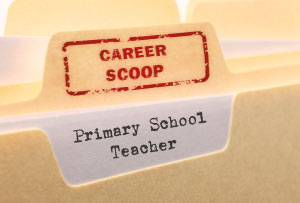 In a nutshell, what do you do?
In a nutshell, what do you do?
Teach children in academic areas – reading, writing, speaking, mathematics, science, history, religion (depending on school), art, geography (SOSE).
Teach children social and emotional skills – making and keeping friendships, manners, respect, organisation, resilience, persistence, working with people, how to behave in different social situations, sharing, consideration of others, following routines, correct behaviour.
Why did you decide to be a teacher?
My parents are both teachers so I spent a lot of time in classrooms and listening to them talk about their jobs. I loved the idea of helping children achieve their best and develop a love for learning new things.
I enjoyed spending time with children and believe that every person is unique and special and deserves the chance to succeed. I love discovering the different strengths that each child has, and helping them develop these. Children are our future so having an opportunity to help nurture these people is such a honour and thrill.
What path did you take?
I did volunteer work in classrooms at both my mum and dad’s schools. I studied a Bachelor of Primary Education at QUT which including practical work at a range of schools. I also worked at Outside School Hours Care at a primary school while I was studying, which helped develop my ability to talk and interact with children and establish good behaviour management skills.
What is the best bit?
I love seeing the changes in each child from the beginning of the year to the end and know that you have helped them reach these achievements. It is great watching how they develop over the year and seeing the growth both academically and socially.
Teaching is so rewarding and I love building a relationship with each child in the class. It is such a wonderful experience to be able to help children become the people they are born to be!
Young children love their teachers! It is so lovely to have so many people think you are wonderful!
What are the worst bits?
There is no overtime pay and you will most definitely do overtime!! There is a lot of outside school hours planning and preparation.
Parents can be difficult and you need to build a good rapport with them right from the beginning. It is important that you keep track of things going on in your room and keep parents informed of any problems or concerns you have. Be considerate and a good listener when talking with parents.
What do the public least understand about what you do?
Teaching is not a 9 – 3pm job!! We only get paid those hours but every good teacher spends most nights and weekends getting ready for lessons, marking and preparing for their class. This is especially apparent during report card time as you are not given any extra time to do report cards and they can take many hours per child.
Also, most teachers will spend a lot of their holidays writing units, making materials and preparing. Although we get a lot of holidays, a good teacher spends a lot of time getting ready for their class.
What kind of people tend to do well?
People with a love of children! You need to be able to talk to children and relate to their lives. You need to be patient, caring, calm and organised.
You need to be able to explain things in a range of different ways to cater for the different children in your class. You need to be able to communicate well and have a desire to learn and help others learn. Having a good work ethic also helps!
Finally, any advice you’d offer to people looking to get into this line of work?
Teaching is such a rewarding occupation! I would recommend doing some volunteer work at a school (you will need a Blue Card) or working in a job involving children to make sure that you do enjoy spending time with children.
You need to be aware that you will do work outside of school hours and be able to commit to doing this well. You will need to work with other teachers across your year level so make sure you are a good listener and communicator.
Remember that you are not there as the children’s friend but as their teacher. Building a good relationship with your class is very important but you need also to establish a routine and structure in your classroom so the children know what is expected of them. Take time to learn good behaviour management skills. Most graduate teachers find this area the most difficult to manage in their first year.
Take each day as it comes! You can be ultra organised but the smallest thing can change your whole day. Being able to think on your feet is a great skill to develop! Being adaptable and having back-up plans/lessons is essential.
Love each child as an individual and enjoy them all! They are amazing little people who will love you. You are such a big part of their lives so enjoy the special feeling you get from being so important to these little people!



